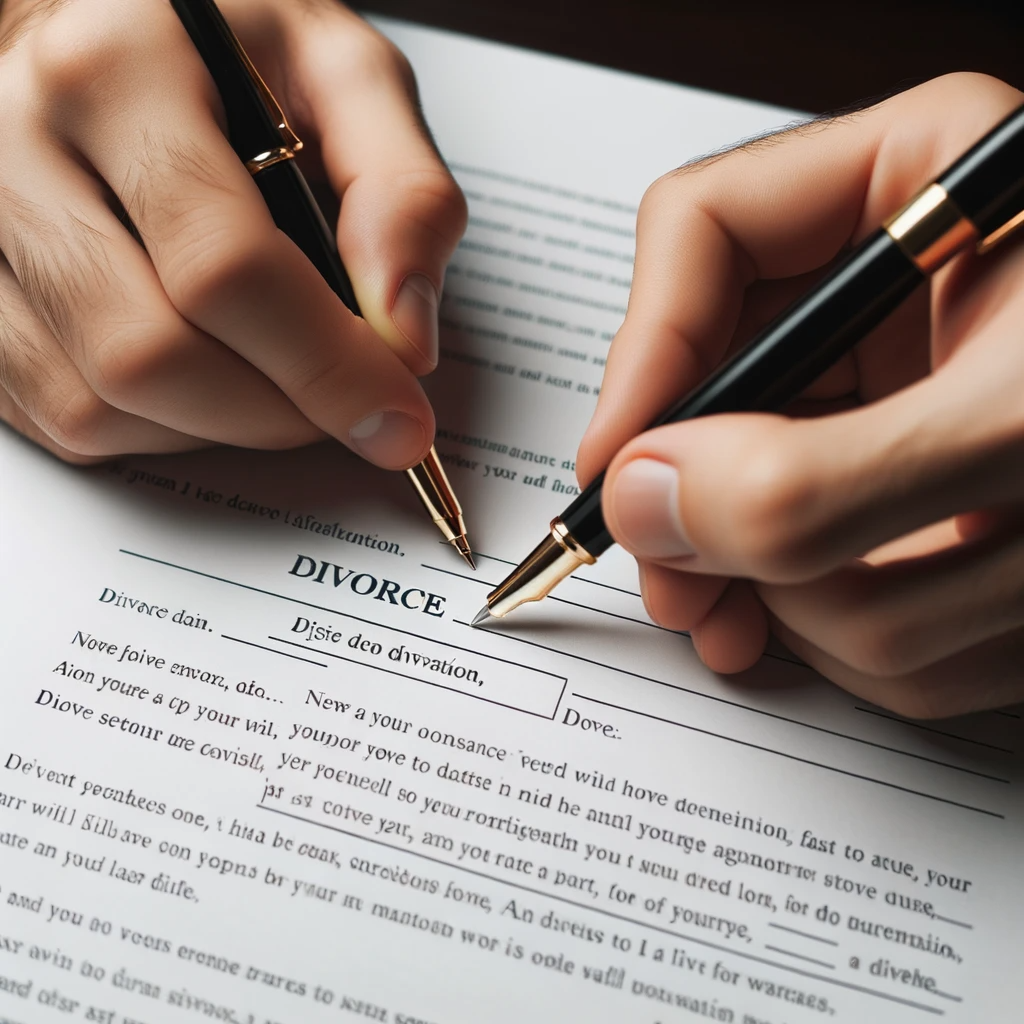If you are considering filing for divorce or have already made the decision, you may understandably feel overwhelmed by the process ahead. Filing for divorce requires careful consideration and preparation, and mistakes can lead to costly delays and setbacks. In this section, we will provide you with a comprehensive guide on how to file divorce papers correctly, ensuring the process is smooth and efficient, and minimizing stress and hassle.




Key Takeaways:
- Filing for divorce can be intricate and stressful, but preparation and attention to detail can make the process much smoother.
- Key documents, including financial records and your marriage certificate, will need to be gathered and organized.
- Choosing the right grounds for divorce is important, and there are different options, including no-fault and fault-based divorce.
- Completing essential divorce forms accurately is crucial for a successful filing.
- The process of serving divorce papers to your spouse can be done in different ways, and it is essential to follow the correct procedure.
Understanding the Divorce Process
Before embarking on the process of filing for divorce, it is important to have a clear understanding of the various stages involved. While the specifics of the divorce process may differ depending on your jurisdiction, there are common steps that apply to most cases. Here, we will provide an overview of the divorce process, including legal separation and dissolution of marriage, to equip you with the knowledge you need to make informed decisions.
Legal Separation
Legal separation is a process by which a couple can live separately while still remaining legally married. It can be a useful option for those who are not yet ready to commit to a divorce but need some time apart to consider their options. During the legal separation process, the couple may negotiate terms such as child custody, spousal support, and property division. These terms are then formalized in a separation agreement, which is a legally binding document that can be enforced in court.
Dissolution of Marriage
Dissolution of marriage is the final stage of the divorce process, resulting in the legal termination of a marriage. To initiate the dissolution of marriage, one party must file a petition for divorce with the court. The petition must include specific details such as the grounds for divorce and any requests for child custody, spousal support, or property division.
Once the petition is filed, the other party must be served with a copy of the petition and given the opportunity to respond. If both parties can come to an agreement on the key issues, such as child custody and property division, they may be able to avoid a trial and instead submit a marital settlement agreement to the court for approval.
If the parties are unable to reach an agreement, the case may proceed to trial, where a judge will make a final decision on the outstanding issues.
Working with Legal Professionals
Given the complexities of the divorce process, it is always advisable to work with legal professionals such as divorce attorneys and mediators. They can provide valuable guidance and support throughout the various stages of the process, ensuring that your interests are protected and that the process runs as smoothly as possible.
Gathering Important Documents


One of the crucial steps in filing for divorce is gathering all the necessary documents. You will need to provide proof of your identification and residency, which is typically done with a driver’s license or passport and a utility bill or lease agreement. Additionally, you will need to provide information about your marriage, such as a marriage certificate and any prenuptial agreements.
In terms of financial records, you will need to gather documentation for all assets and debts, including bank statements, investment accounts, and credit card statements. You should also compile tax returns for at least the last three years and any pay stubs or other income information.
If you have children, you will need to provide documentation about their care, including custody agreements and child support orders. It may also be necessary to provide medical records and school records.
Be sure to keep all of these divorce documents organized and in a safe place, as you may need to refer to them throughout the divorce process.
Choosing the Right Grounds for Divorce


When filing for divorce, it is important to select the correct grounds. This will vary depending on your jurisdiction and can have a significant impact on the outcome of your case.
No-Fault Divorce
A no-fault divorce is when neither party is to blame for the dissolution of the marriage. This ground is becoming increasingly common, and in many states, it is the only option. This can simplify the process and result in a smoother divorce.
Fault-Based Divorce
Fault-based divorce is when one party is considered responsible for the breakdown of the marriage. This can include grounds such as adultery, cruelty, or abandonment. While less common, fault-based divorce can have advantages, such as receiving a more favorable settlement or custody arrangement. However, it can also be more complex and require more evidence.
Consult with a legal professional to determine which grounds for divorce are available in your jurisdiction and which option is best for your unique situation.
Completing the Divorce Forms
Once you have gathered all the necessary documents, the next step is to complete the divorce forms accurately. There are different forms you will need to fill out, including the petition for divorce, marital settlement agreement, and child custody forms, among others. Here is a breakdown of each divorce form:


Petition for Divorce
The petition for divorce is the main document that initiates the divorce process. It outlines the basic information about you, your spouse, and the reason for the divorce. You will need to provide your full name, your spouse’s full name, the date of your marriage, and the grounds for divorce. Be sure to check your state’s requirements for the grounds for divorce.
Marital Settlement Agreement
The marital settlement agreement is a written agreement between you and your spouse that details the terms of the divorce. It includes information on how property, assets, and debts will be divided, as well as child custody and support. It is important to be thorough and specific when filling out this form to avoid any confusion or disputes later on.
Child Custody Forms
If you have children, you will need to fill out additional forms related to child custody and support. These forms detail the custody arrangements, visitation schedules, and child support payments. Be sure to consult with a legal professional if you have any questions about these forms.
It is important to note that some states may have additional forms or requirements, so be sure to check your local courthouse or consult with a legal professional for specific instructions.
Remember to fill out all forms accurately and truthfully. Falsifying information or leaving out important details can result in legal consequences or delays in the divorce process. By completing your divorce forms correctly, you can ensure a smooth and efficient filing process.
Serving Divorce Papers to Your Spouse
After completing the necessary paperwork, it is crucial to serve the divorce papers to your spouse. There are several methods of service, including hiring a process server, delivering them in person, or sending them via certified mail.


If you opt for a process server, ensure that they are licensed and authorized to serve legal documents in your state. They will track down your spouse and deliver the papers, filing a proof of service with the court once completed. If you choose to deliver the papers yourself, make sure to have a neutral third party, such as a friend or family member, present to witness the delivery.
Sending the papers via certified mail is also an option, although it is generally not recommended as it may be challenging to prove that your spouse received the documents. If you do choose this method, make sure to request a return receipt to confirm that the papers were received.
Once the papers have been served, your spouse typically has a certain amount of time to respond, depending on your jurisdiction. Make sure to keep track of all deadlines and file any necessary paperwork with the court in a timely manner.
Navigating the Negotiation Process
Divorce is often a challenging and emotional process, but negotiating a settlement agreement can help reduce the stress and conflict.
One option for negotiating a divorce settlement is mediation. Mediation involves working with a neutral third party to identify issues and develop a mutually acceptable agreement for both parties.
During mediation, both parties will have an opportunity to express their concerns, needs, and interests. The mediator will help facilitate the conversation and guide the couple towards a resolution.
Mediation can be a less expensive and less time-consuming process than navigating the court system. It can also be less adversarial, which can create a more positive and less traumatic experience for everyone involved, including any children.
If mediation is not an option, negotiating a settlement agreement with your spouse or their attorney may be necessary.
It is essential to approach these negotiations with clear goals and expectations. Consider what you want to achieve and be prepared to compromise on some issues. Keep in mind that a successful negotiation means both parties walk away feeling like they have gained something important.



REMEMBER
Remember that the goal of any negotiation is to reach a mutually acceptable agreement that benefits everyone involved. Be willing to listen, be open to new ideas, and be patient.
Navigating the negotiation process can be challenging, but with an open mind and a willingness to compromise, it is possible to achieve a successful divorce settlement that works for everyone involved.
Attending Court Proceedings
Attending court proceedings can be intimidating, but it is an essential part of the divorce process. It is important to prepare for the divorce hearing and consider obtaining legal representation to ensure your rights are protected.
Preparing for the Divorce Hearing
Before attending the divorce hearing, it is recommended to review all the documents filed and make copies for your records. You should also prepare a list of any questions you may have and review any evidence you plan to present. Dress appropriately and arrive early to avoid any last-minute complications.
Consider Legal Representation
While it is not mandatory to have legal representation during the court proceedings, it is often recommended to ensure your interests are well-represented. A divorce lawyer can guide you through the process, protect your rights, and provide a clear understanding of the legal terminology and implications of the case.
Conclusion
Attending court proceedings is an essential part of the divorce process, and it is crucial to prepare adequately and consider legal representation. By following these guidelines, you can ensure a successful court appearance and protect your rights throughout the divorce proceedings.
Conclusion
Divorce can be a challenging process that involves a lot of paperwork, negotiation, and court proceedings. However, by following this step-by-step guide on how to file divorce papers correctly, you can ensure a smooth and efficient process that reduces stress and anxiety.
Remember that every divorce is unique, and it’s essential to seek personalized advice from a legal professional to ensure the best possible outcome. Whether you choose to negotiate a settlement or attend court proceedings, having the right support and guidance can make all the difference.
By staying organized, informed, and focused on your goals, you can successfully navigate the divorce process and start a new chapter in your life.



FAQ
How do I file divorce papers?
To file divorce papers, you will need to follow the specific guidelines and requirements of your jurisdiction. However, generally, the process involves completing the necessary forms, serving the papers to your spouse, and attending court proceedings if required. It is recommended to consult with a legal professional for personalized guidance.
What are the grounds for divorce?
The grounds for divorce vary depending on your jurisdiction. However, common grounds include irreconcilable differences, adultery, abandonment, cruelty, and imprisonment. It is important to understand the specific grounds applicable in your area and choose the one that best suits your situation.
What documents do I need to gather for divorce?
When filing for divorce, you will need to gather important documents such as financial records, marriage certificate, tax returns, bank statements, and any prenuptial agreements. These documents will help provide a comprehensive overview of your assets, debts, and marital history.
Can I file for a no-fault divorce?
Many jurisdictions allow for no-fault divorces, where neither party is required to prove fault or wrongdoing. In a no-fault divorce, the reason for the dissolution of the marriage is usually cited as irretrievable breakdown or irreconcilable differences. However, it’s important to check the laws in your jurisdiction to determine if this option is available.
How do I serve divorce papers to my spouse?
The process of serving divorce papers to your spouse can vary depending on your jurisdiction. Some common methods include hiring a process server to deliver the documents personally or sending them via certified mail with a return receipt requested. It is crucial to ensure that proper service is completed according to the legal requirements.
What is the negotiation process in a divorce?
The negotiation process in a divorce involves discussing and reaching agreements on important matters such as property division, child custody, child support, and spousal support. This process can be facilitated through mediation, where a neutral third party helps facilitate discussions and find mutually acceptable solutions.
Do I need to attend court proceedings for my divorce?
Depending on the complexity of your divorce and the agreements reached during negotiation, you may need to attend court proceedings. This can include divorce hearings, where a judge will review the case and make decisions if necessary. It is recommended to consult with a legal professional to understand the specific requirements for your situation.
How long does the divorce process take?
The divorce process timeline can vary depending on several factors, including the complexity of the case, jurisdiction, and cooperation between the parties involved. Some divorces can be finalized within a few months, while others may take significantly longer. It is best to consult with a legal professional to get an estimate based on the specifics of your situation.
Can I file for divorce without legal representation?
While it is possible to file for divorce without legal representation, it is generally recommended to consult with a divorce attorney. A divorce attorney can provide valuable guidance, ensure your rights are protected, and help navigate the complex legal procedures and paperwork involved in the divorce process.





Leave a Reply